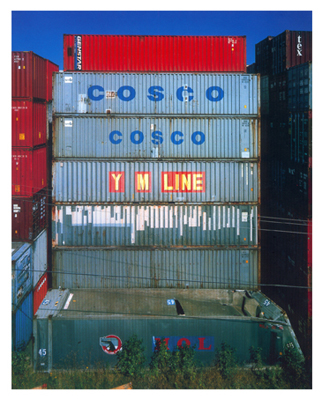| Stan Douglas Damaged Containers. Mitchell Island, 2001 |
| Photograph | C-Print |
| 121.9 x 144.8 cm |
 |
Damaged Containers. Mitchell Island is one of those uncertain landscapes which are a product of the artist’s work process; a place that looks like a prefabricated setting but which has in fact been taken in a particular location, the port area of the city of Vancouver. An image constructed from large metal containers in bright colours that organise an architectural space stripped of clear references, uninhabited and deserted. Large containers waiting to be transported by cargo ships whose presence on the land shapes a particular geography, apparently objective and aseptic but at the same time disconcerting precisely because it is stripped of any “additional” information, since it is the product of a neutral, dispassionate camera. A photograph that is inserted as a key, one of many possible ones, within this “altered” work process, and which begins with a selection and deconstruction of narrations, actions and images which are highly signified in the processes of redistribution of economic and political power in a globalised world. These agreed stories on which the artist’s, and the spectator’s, gaze alights once again through the construction of systems, fabrics and plots that are superimposed and provide a host of – sometimes opposing – readings about the major issues that define this “new world order”. Revised books, films and stories – versions and remakes – are the materials from which Douglas starts to pose constant questions about the ideological production of images, frequently stripped of meaning, at the present time. A project that becomes a constant negotiation with odd references that are relocated in a territory that questions itself about the transformation operated by the impact of the media and the new technologies, in what is also an operation that shows up the blurred boundaries between reality and fiction, between the history of representation and its subjectivity. Beatriz Herráez |

